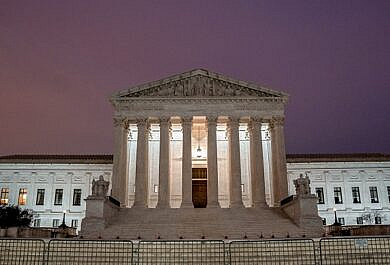The Supreme Court granted an emergency request from the Biden administration and drugmaker Danco Laboratories to put on hold a lower court injunction that would have greatly limited the availability of mifepristone, a widely used abortion pill.
Summary
The Supreme Court granted an emergency request from the Biden administration and drugmaker Danco Laboratories to put on hold a lower court injunction that would have greatly limited the availability of mifepristone, a widely used abortion pill.
- Justices Samuel Alito and Clarence Thomas dissented from the decision to stay rulings from a Texas-based district judge who suspended several FDA authorizations of mifepristone, throwing the availability of the drug into jeopardy.
- The Supreme Court’s decision in Friday will keep mifepristone on the market indefinitely until the legal process has been exhausted.
- Mifepristone is one part of the two-drug regimen used in most medication abortions in the United States, which make up more than half of all abortions that occur in the US.
- The Supreme Court’s move will almost certainly maintain the mifepristone status quo into 2024 as the case works its way through the appeals process – and potentially returns to the high court. A three-judge panel of the 5th Circuit will hear arguments on May 17, with a decision to come in the months after that.
![]()
- The case will return to the 5th Circuit, where the majority of judges are conservative but, as CNN noted, the three-judge panel that will re-hear the case hasn’t yet been selected so there’s no way to tell yet how the appeals court will rule.
- The New York Times’s Katie Glueck wrote “the battle over abortion rights has catapulted to the center of the emerging 2024 election season, igniting Democrats, dividing Republicans and turbocharging sensitive debates over health care.” After the debate was reignited by last year’s Dobbs decision overturning Roe v. Wade, these political fights won’t be ending anytime soon.
- The Washington Post quoted from Justice Alito’s dissent, where he argued the public would not have been harmed had the Supreme Court allowed the lower court to reinstate older FDA regulations. “It would simply restore the circumstances that existed (and that the Government defended) from 2000 to 2016 under three Presidential administrations,” Alito wrote. “Contrary to the impression that may be held by many, that disposition would not express any view on the merits of the question whether the FDA acted lawfully in any of its actions regarding mifepristone.”
![]()
- The Wall Street Journal predicted the final outcome of this case would not come for “many months” as it winds its way through the federal court system. The Fifth Circuit will hear the case again in mid-May but there is no deadline for them to issue an opinion after that hearing.
- Fox News noted mifepristone “is 97% effective in terminating early pregnancy, though approximately 3% of women who take it will ‘require surgical intervention for ongoing pregnancy, heavy bleeding, incomplete expulsion or other reasons such as patient request,’ according to the manufacturer.”
- National Review quoted a lawyer for Alliance Defending Freedom, one of the plaintiffs challenging the FDA approval of mifepristone. “As is common practice, the Supreme Court has decided to maintain the status quo that existed prior to our lawsuit while our challenge to the FDA’s illegal approval of chemical abortion drugs and its removal of critical safeguards for those drugs moves forward. We look forward to a final outcome in this case that will hold the FDA accountable.”
© Dominic Moore, 2023






